Did you know that Truthout is a nonprofit and independently funded by readers like you? If you value what we do, please support our work with a donation.
During a speech on Thursday at the Economic Club of New York, former President Donald Trump suggested that he would enlist multi-billionaire Elon Musk to work in his administration and help him make cuts to government spending.
Musk, who owns Tesla, X (formerly Twitter) and SpaceX, apparently made the suggestion to Trump himself, the Republican nominee for president explained.
“I will create a government efficiency commission tasked with conducting a complete financial and performance audit of the entire federal government and making recommendations for drastic reforms,” Trump said during his speech. He added:
Elon, because he’s not very busy, has agreed to head that task force. It’ll be interesting. If he has the time, he’ll be a good one to do it.
On X, Musk said he was “look[ing] forward to serving America if the opportunity arises.”
Musk, who decided to endorse Trump in July, would be a controversial choice to audit the government, to say the least. Since his purchase of Twitter two years ago, the site has become a bastion of far right extremism, with a notable rise in antisemitic content from white supremacist accounts, which Musk himself has often promoted by sharing such posts to his own profile.
Most recently, Musk shared an interview by former Fox News host Tucker Carlson, in which his guest wrongly suggested that the Holocaust during World War II was an accidental outcome, the fault of Allied powers reacting too aggressively to Adolf Hitler’s invasion of Poland. In reality, the Nazi regime was sending Jewish people to concentration camps a year before that invasion, and Jews were persecuted and stripped of any political rights at the start of Hitler’s chancellorship in the early 1930s.
Despite these well-established facts, Musk seemingly agreed with Carlson’s guest, sharing a video of their interview on his account, calling it “very interesting” and “worth watching.” He later deleted the post.
Musk also regularly shares conspiracy theories to his account, including the long-debunked “Pizzagate” theory that wrongly alleged that Democrats were part of a cult that preyed on children in a pizzeria.
X is currently banned in Brazil for Musk’s refusal to name a legal representative to a court case in that country over complaints that the site isn’t dealing with hateful content in compliance with regulatory standards there. The billionaire has blasted Brazil for supposedly censoring his website — however, X itself regularly censors users on the site, including suspending journalists who have written articles about Musk that he disliked.
Musk’s supposed defense of free speech is also dubious for other reasons. Earlier this year, in response to college demonstrators removing a U.S. flag from a campus to protest against Israel’s genocide of Palestinians in Gaza, Musk said that anyone performing such an act of civil disobedience should be deported from the country.
Trump’s desire for Musk to be auditor of the government is perhaps tied with the Republican candidate’s economic plan, which includes calls for enormous tax cuts, much of which would be an extension of the cuts that went to the ultra-wealthy during his first tenure as president. This new round of tax cuts would total $10.5 trillion over the next decade.
That amount is greater than the total spending for non-defense discretionary expenditures in the federal government, which totals $9.8 trillion and funds programs for health care and health research, veterans’ medical care and services, transportation services, the advancement of science and energy programs, and other spending priorities.
If Trump’s proposal becomes a reality, Republicans would likely try to cut spending on these programs in order to deal with the immense debt that would be created by the tax cuts.
A terrifying moment. We appeal for your support.
In the last weeks, we have witnessed an authoritarian assault on communities in Minnesota and across the nation.
The need for truthful, grassroots reporting is urgent at this cataclysmic historical moment. Yet, Trump-aligned billionaires and other allies have taken over many legacy media outlets — the culmination of a decades-long campaign to place control of the narrative into the hands of the political right.
We refuse to let Trump’s blatant propaganda machine go unchecked. Untethered to corporate ownership or advertisers, Truthout remains fearless in our reporting and our determination to use journalism as a tool for justice.
But we need your help just to fund our basic expenses. Over 80 percent of Truthout’s funding comes from small individual donations from our community of readers, and over a third of our total budget is supported by recurring monthly donors.
Truthout has launched a fundraiser, and we have a goal to add 242 new monthly donors in the next 48 hours. Whether you can make a small monthly donation or a larger one-time gift, Truthout only works with your support.
